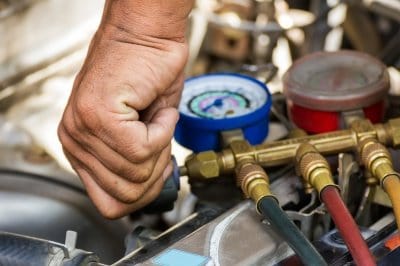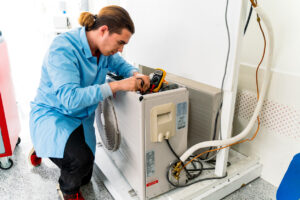Here it is folks…..
The much requested, highly anticipated, sought after step-by-step guide to how and why an air conditioning tune-up should be performed once a year. Let me start by introducing myself. I am Craig Elliott, a licensed master HVAC technician and gas fitter. I am also a class A licensed contractor. I have 20 years of experience in the field, and I’m an expert.
But enough about me…..
let’s talk about the classic spring tune-up. What is it? Why is it necessary? Is it really so important? Let me break it down for you, if you really want to know.
The purpose of a spring tune-up of your heating and cooling equipment is to ensure proper operation. Basically, this means that you want the system to turn on when it’s supposed to.
Also, you don’t want to have to think about the temperature, and you don’t want your bills to be too high. You know you’re going to get bills for your heating and cooling, but you just don’t want them to be too high. That’s the real reason most people get a tune-up.
Why get an air conditioner tune-up?
Sometimes you get a tune-up because you’re selling your house, and the buyer’s home inspector requests it. For most of you, however, it’s just that you want make sure your equipment is going to work when you need it, with minimal hassle.
That’s the only reason you’re willing to take time out of your schedule and sit around while a guy tinkers with your equipment in the basement, just to tell you everything’s okay. I want to make sure you know why a tune-up is important, why it’s worth your time. I also want you to know that I understand the investment you’re making, and I still believe the value is there for most folks.
If you’re super rich, then it might be more convenient for you to forget the tune-up and just buy a new air conditioning system every time something breaks, so this article isn’t for you. More power to you, but I’m speaking to the folks who want to keep their AC system running, keep their bills down, and keep the worry and hassle to a minimum.
You want your AC to work….
especially when it’s 90 degrees outside and it’s your daughter’s birthday party and you’re trying to make everything perfect. Or, it’s Fourth of July and you’re finally hosting a party. Or, you just moved in to your house and you’re having people over. It’s smoking hot outside, but you have no relief inside because the AC’s down.
These are the scenarios our clients want to avoid, and we understand. Getting that AC tuned up means we’re going to find any problems, take them out back and put them down, if you know what I’m saying.
We consider ourselves problem detectives. Some clients, while they understand what they want, they don’t like the idea of someone looking for trouble. That’s what we do, however. We look for trouble.
What is an air Conditioner Tune up?
A good tune-up should include regular maintenance that includes cleaning the outdoor coils and the drain line, and all the time-tested maintenance procedures that clean out the dirt that affects your system’s performance.
Things like the fan inside the blower, the evaporator coil, etc., these should be inspected each year. They don’t necessarily have to be cleaned yearly, but they should be assessed.
You can get biological growth on your indoor coils, which can lead to some nasty stuff, and it doesn’t take a whole lot of dirt on that inside fan to drastically reduce your capacity and efficiency, so we need to look at those things to make sure we can address an issue before it becomes a problem.
We’re going to test operations and capacity size, make sure all the wires are tight, plus a bunch of other things, but the main focus maintenance-wise is cleaning the coil and getting that drain line clean.
Number One Cause of Service Calls
in the summertime is clogged drain lines that lead to water damage of equipment and property, and usually a soaking wet, sopping carpet that smells. If that happens you’ll need mold remediation. It’s a mess, and nobody wants it. We always flush out those drain lines for our clients, to make sure that you’re not dealing with a clogged pipe.
In some extreme situations, clogged pipes do occur even with the flushing. Sometimes, that pipe might need to be replaced. If it’s too gunked up, flushing it might just clear a little bit of space for water to drain, but then it will clog back up. In those situations, a new piping system has to be installed. These are the types of things we’re going to look for.
That drain line is your number one enemy. It has to have a good pitch. All the joints have to be glued properly. It has to have a trap so there’s no wasted air down the pipe, but the trap can accumulate mold, mildew, sludge, slime — all types of nasties that can clog it up and lead to water damage. Trust me, your furnace doesn’t like water. You have circuit boards in there, you have motors, and those things do not like moisture.
Whenever we go to a client’s house, we always recommend water safety devices. They are products you can add to your system to turn it off if a water issue occurs, to minimize any damage. We always recommend them our clients so they can prevent the number one cause of service calls, which is clogged condensate drain line.
- Good Air Conditioner Tune Up
To check the outdoor coil, we pull air through the sides of the unit and blow it out the top. That’s very important to the process. If this test finds dirty air, it means you’re not pulling as much air.
What that means is you’re not getting as much AC blast as you should get, and sometimes it’s not blasting at all. One of our goals in doing your tune-up is to make sure the coil is totally clean, so we use nontoxic but powerful chemicals to clean all the gunk, pollen, sap and dirt out of the unit.
This is a process that we do with every one of our tune-ups because part of the unit is outside, exposed to the elements. Even if you can’t see it, we know there’s film and residue buildup, so we chemically clean all the coils. This is always included in a good tune-up.
Last, but not least, is the air filter inside. We want to make sure that we put a fresh air filter in the system. We don’t sell air filters at our company, but if you have one there, any good technician should be willing to install it for you.
After the filter, we check the system: how old is it, how’s it been functioning, are all the wires tight? Loose wires cause heat buildup and damage. Are all the screws tight? Loose screws can cause vibration damage and noise.
We check for refrigerant leaks to make sure you’re not losing any of that valuable Freon. The price of Freon has almost quadrupled this year as manufacturers continue to phase it out in favor of alternatives that are safer, more efficient, and friendlier to the environment.

Back to the tune-up…
We’re going to want to inspect your system to make sure everything is in working order, that nothing is out of the ordinary. We want to make sure that everything is tight and secure, working the way it should. We’re going to take electrical readings of all your motors, all the as we call them, to assess if they’re near capacity.
We’re going to make sure you have good airflow. We’ll inspect the duct system. Any good service company should make sure the system is blowing into a well-functioning duct system. Remember, you could have a great system with filthy ducts or poorly designed ones, and you will lose capacity and efficiency right there. We’re going to inspect the duct system for you to make sure those ducts are clean and healthy, ensuring optimum performance.
- Safety First!
It’s also our policy, as part of our high level of service, to inspect your dryer vent for you. A lot of folks don’t realize how many homes are lost to dryer fires, so we make a point to simply check. We have the technology, and all of our technicians carry digital boro scope cameras. We inspect every single dryer vent to make sure you’re not at risk. You’d be surprised at some of the things we find in the vents.
But how is it cooling?
Once we’re done with your dryer vent inspection, we’re going to want to make sure that when the AC is working we’re not gaining all of the heat back that we discharged. That’s what your air conditioning unit is really doing, folks. It is not cooling your house, it is rejecting heat. You see, heat is energy that is moving around your home, and your air conditioning system absorbs that energy, takes it outside and discharges it as heat. That heat wants to fill a void, so as you discharge the energy, more heat wants to fill it, and that’s why it’s hot upstairs. There’s a lot of heat in the attic, and it wants to fill the void where you recently removed heat via the air conditioning system. We are removing heat, folks.
Thanks for reading!
That’s all I have for now on the tune-up. I hope this helps you realize how important it is, why we do the things we do, and what it really means for you. We have a passion for what we do. It’s boring to some folks, but for us, it’s life.
Keeping a unit running, advising the client on how to prevent a catastrophe, helping them stay comfortable – we love it! Thanks for reading. I’ll catch you next time, next article.
 SEE OUR SPECIALS
SEE OUR SPECIALS SCHEDULE SERVICE
SCHEDULE SERVICE





 Call 703-884-2376
Call 703-884-2376


